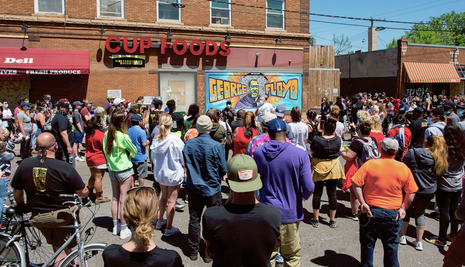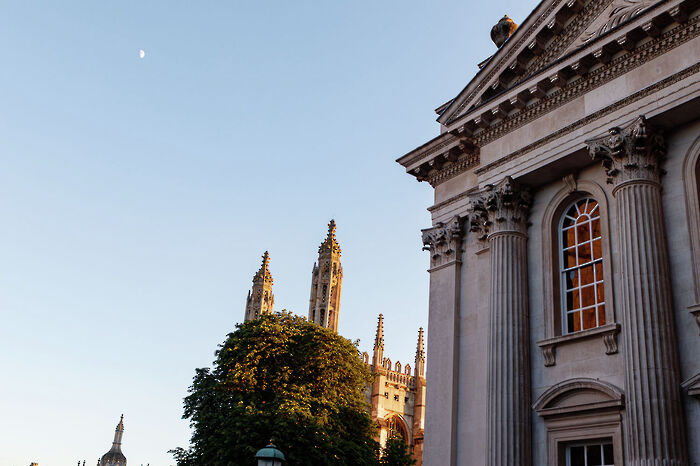‘There is always pain, yet never shock’: Cambridge reacts to the death of George Floyd
As four Minneapolis police officers face various murder charges relating to the death of George Floyd, students and campaign groups react to George Floyd’s death and suggest ways in which the University community can now combat anti-Black racism

CUSU’s Black and Minority Ethnic Campaign (BME), The Cambridge University African Caribbean Society (ACS), the President of the Black Cantabs Research Society, and the founder of a new ‘Inequality in Stop and Search’ data project have spoken to Varsity to discuss George Floyd’s death.
CUSU’s BME Campaign’s official statement on George Floyd’s death sought to highlight that racism, violence and injustice against Black people is experienced in Cambridge, not just distant American cities.
The CUSU BME Committee told Varsity that they are “coordinating with BME Officers to help them support the welfare of Black students in their colleges during this difficult time,” such as by running drop-in sessions.
They said that they “will continue to collaborate with BME Officers and student societies such as Cambridge ACS to support the welfare and wellbeing of Black students, especially since no one else has been stepping up”.
They also urged that welfare support to Black students is not only the responsibility of the Campaign, BME Officers and other societies, such as Cambridge ACS. They commented that college student committees and colleges should “grasp the magnitude of these events and respond adequately and sufficiently, putting energy into thinking of concrete ways they can materially support their Black students both now and over the longer term, and challenge the structures of racism that are embedded in the Collegiate University”.
An open letter to the University from the BME Campaign, criticising its response to George Floyd’s death and pressing for Cambridge to show a greater commitment to anti-racism, had been signed by over 2000 students by Thursday (04/06) evening.
A list of recommendations on how students can assist the Black community has also been shared on the BME Campaign’s Facebook page. Many students have encouraged their peers to demonstrate material solidarity to the BLM movement, for instance by donating to bail funds. Racist state violence is not a practice just limited to the United States, and students have been sharing ways to fight anti-blackness closer to home, such as by pressuring MPs to lobby against UK sales of rubber bullets and tear gas to the United States, and demand further investigation into the death of Belly Mujinga, a Black woman who died of Covid-19 after being spat on by a member of the public, who claimed to be infected whilst at work.
Saron Mehari, the President of Cambridge ACS, told Varsity that the society has been using social media platforms over the lockdown to share tips with its members on preserving mental health, also launching ‘The Catch Up’ series. Mehari explained the latter allows “Black students [...] to come together virtually and just express how they’ve been feeling; the good, the bad and the ugly”.
With respect to George Floyd’s murder, she voiced her concern that “it says a lot about our society that it took a nine-minute video of a Black man crying out for help, for his mum and then for his life...for the world to wake up to the reality of racism.” She added a sobering point, claiming that “there is always pain, yet never shock when it comes to the senseless, racially motivated murder of black people”.
She added that “we belong to an international community greater than all injustice [...] we will continue to take pride in that as we fight racism. Black Lives Matter.”
However, these reactions in Cambridge were tainted by the discovery of a white supremacist sticker on a lamppost at the intersection with Pembroke Street on Tennis Court Road, on Monday night.
Surer Mohamed, the postgraduate student who found the sticker, and also the President of the Black Cantabs Research Society, told Varsity that these stickers constitute an “attempt to normalise language around White Supremacy.” Mohamed believes that this sticker should be considered in its context, with there being three messages behind it: the wording, which attempts to “obscure white nationalist language”, the hand gesture, which is a “signal in polite company”, and “the fact of its existence in public space”, which she believes is “an attempt to try to claim space”.
As for Floyd’s murder, she warned that “consciousness is ephemeral, and it is important to focus on the catalysation of change in institutional fabrics, and the use of that catalysation for substantive change”.
Mohamed encourages others to not remove these stickers manually by hand, as there have been instances in which far-right extremists have placed razor blades beneath the surfaces of the stickers.
Varsity also spoke to Henry Wright, a student in Computer Science at Homerton College, who has created a new ‘Inequality in Stop and Search’ data project.
The tool allows users to compare the number of white and BAME people stopped and searched by police in any English or Welsh police force area. Wright developed the project as he “felt angry at the news coming out of the States and wanted to highlight some of the inequalities that still exist here in the UK in a way that’s easier than digging through Government websites”.
According to the tool, an average of 3.6 white people were stopped and searched for every 9.5 BAME people in Cambridgeshire between 2016-19.
In another demonstration of Black solidarity, Good Health Africa, Afrobeats Peterborough and AfroCam have co-organised a socially-distanced protest to take place at Parker’s Piece from 2 pm on 6th June.
If you have been affected by any of the issues raised in this article, the following information and support is available:
- Mind: A mental health charity providing free online resources.
- Samaritans: A 24-hour mental health helpline.
- The Black, African and Asian Therapy Network: A list of free services available across the UK.
- Ways To Help: A collection of resources, including petitions and bail funds, compiled by Black Lives Matter.
- Learn To Be An Active Bystander: Learn how best to challenge antisocial and discriminatory behaviour on campus.
- CamQuaranchats Podcast: The most recent episode of the CamQuaranchats podcast where students talked about their experiences of institutional racism at Cambridge.
 News / Judge Business School advisor resigns over Epstein and Andrew links18 February 2026
News / Judge Business School advisor resigns over Epstein and Andrew links18 February 2026 News / Gov grants £36m to Cambridge supercomputer17 February 2026
News / Gov grants £36m to Cambridge supercomputer17 February 2026 News / Hundreds of Cambridge academics demand vote on fate of vet course20 February 2026
News / Hundreds of Cambridge academics demand vote on fate of vet course20 February 2026 News / CUCA members attend Reform rally in London20 February 2026
News / CUCA members attend Reform rally in London20 February 2026 News / Union speakers condemn ‘hateful’ Katie Hopkins speech14 February 2026
News / Union speakers condemn ‘hateful’ Katie Hopkins speech14 February 2026










